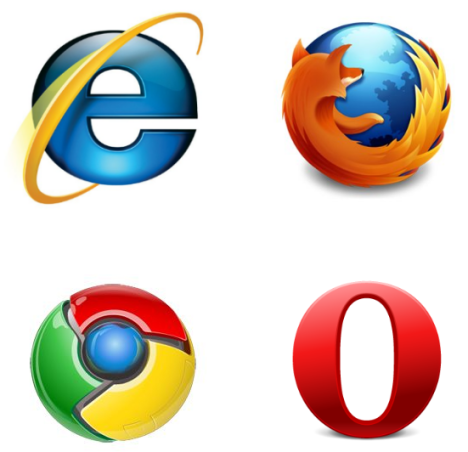Which browser will allow you to conserve battery power for longer?
If the duration of your laptop or netbook without recharging leaves much to be desired, then you will probably be interested in a comparative test among browsers in terms of power consumption.

Continued under the cut.
Testing process.
For the comparative test, the following browsers were used without any additions: Internet Explorer 9, Internet Explorer 10 beta (included with Windows 8 Consumer Preview), Google Chrome 18, Mozilla Firefox 11 and Opera 11.62.

For tests, a laptop was used for more than 2 years old HP Pavillion dv7 2185dxwith the following configuration: Intel Core2 Quad CPU Q9000 @ 2.00 GHz, 6 GB RAM DDR2, ATI Mobility Radeon HD 4650. This model has always been positioned as an alternative replacement for a stationary PC, and therefore the battery life was not very priority. And even after two years, time has not changed and is a little less than two hours.
All tests were conducted on pure Windows 7 without any additional software and with the latest updates installed. In addition, the tests were carried out in an economical mode of battery operation, and in the settings, in addition to canceling the hard drive shutdown, a transition to Sleep was also set only after a critical battery level was reached.
For Internet Explorer 10 beta, a clean installation of Windows 8 Consumer Preview on the same laptop was used. The battery mode settings remained the same as in Windows 7.
The Peacekeeper battery test was used as the main test tool, which allows you to load your browser until the battery runs out of power and the laptop falls asleep. For each browser, the test was run at least 3 times. Unfortunately, some attempts were unsuccessful and had to start over. There were many reasons: from small breaks in the Internet connection and the fact that Peacekeeper did not record the results, and ending with the banal crashes of the browsers themselves.
For each browser, the successful completion of the test for three times was taken into account, after which the average results were calculated based on which the comparison was carried out.
Observations: instability - Google Chrome, consistent results - Internet Explorer 10 beta.
Among all tested browsers, with Google Chrome the most problems arose. Most of the tests run on it have not been completed successfully. Firstly, there was a problem with the browser crash around the middle of the test, which disappeared after reinstalling it. Then, part of the tests simply did not end, as a result of which there were also no final data on the output. The reason for this behavior was not found out. In addition, it was noticed that despite the fact that the laptop stood on the table all the time, and no one touched the mouse and keyboard, the laptop screen was activated from time to time, which probably had a significant impact on the battery life when testing Google’s browser . In other browsers, nothing like this was observed.
It is also worth noting the stability of the results for Internet Explorer 10 beta. The difference between the results of individual tests was minimal (for example, the difference in the best and worst battery life was only 4 minutes). However, Mozilla Firefox turned out to be the most unstable. The difference between the worst and the best result was 21 minutes.
All browsers, with the exception of Google Chrome, passed the tests without any serious problems and showed pretty stable performance.
Results: Internet Explorer provides the longest battery life.
So below are the average results obtained during the test.

Thus, if you need a browser that allows you to maintain the survivability of your laptop as long as possible without recharging, then depending on the operating system it is best to choose Internet Explorer 10 or 9. Both browsers showed very close results, showing an average battery life of 108 and 104 minutes.
If we evaluate the performance of the browser, then Google Chrome turned out to be the winner, showing a result that is 126% higher compared to Internet Explorer 10. However, this browser also showed the worst result in battery life (the difference was 21%). The impression was that thanks to the use of all available resources by the browser, the ability to save battery power in Windows 7 simply comes to naught.
The most trade-off between performance and uptime is Opera. Having lost Internet Explorer 10 and 9 on the order of 7% in battery life, its performance turned out to be better by 78%.
Conclusion
Judging only by the numbers, Internet Explorer and Opera can be noted as the best. But of course, to determine which browser is better to use is a purely choice and personal preferences of each, depending on his needs and tasks.
I will be glad to see your observations in the comments about the dependence of the duration and performance of the browser you are using.
The original article is here.

Continued under the cut.
Testing process.
For the comparative test, the following browsers were used without any additions: Internet Explorer 9, Internet Explorer 10 beta (included with Windows 8 Consumer Preview), Google Chrome 18, Mozilla Firefox 11 and Opera 11.62.

For tests, a laptop was used for more than 2 years old HP Pavillion dv7 2185dxwith the following configuration: Intel Core2 Quad CPU Q9000 @ 2.00 GHz, 6 GB RAM DDR2, ATI Mobility Radeon HD 4650. This model has always been positioned as an alternative replacement for a stationary PC, and therefore the battery life was not very priority. And even after two years, time has not changed and is a little less than two hours.
All tests were conducted on pure Windows 7 without any additional software and with the latest updates installed. In addition, the tests were carried out in an economical mode of battery operation, and in the settings, in addition to canceling the hard drive shutdown, a transition to Sleep was also set only after a critical battery level was reached.
For Internet Explorer 10 beta, a clean installation of Windows 8 Consumer Preview on the same laptop was used. The battery mode settings remained the same as in Windows 7.
The Peacekeeper battery test was used as the main test tool, which allows you to load your browser until the battery runs out of power and the laptop falls asleep. For each browser, the test was run at least 3 times. Unfortunately, some attempts were unsuccessful and had to start over. There were many reasons: from small breaks in the Internet connection and the fact that Peacekeeper did not record the results, and ending with the banal crashes of the browsers themselves.
For each browser, the successful completion of the test for three times was taken into account, after which the average results were calculated based on which the comparison was carried out.
Observations: instability - Google Chrome, consistent results - Internet Explorer 10 beta.
Among all tested browsers, with Google Chrome the most problems arose. Most of the tests run on it have not been completed successfully. Firstly, there was a problem with the browser crash around the middle of the test, which disappeared after reinstalling it. Then, part of the tests simply did not end, as a result of which there were also no final data on the output. The reason for this behavior was not found out. In addition, it was noticed that despite the fact that the laptop stood on the table all the time, and no one touched the mouse and keyboard, the laptop screen was activated from time to time, which probably had a significant impact on the battery life when testing Google’s browser . In other browsers, nothing like this was observed.
It is also worth noting the stability of the results for Internet Explorer 10 beta. The difference between the results of individual tests was minimal (for example, the difference in the best and worst battery life was only 4 minutes). However, Mozilla Firefox turned out to be the most unstable. The difference between the worst and the best result was 21 minutes.
All browsers, with the exception of Google Chrome, passed the tests without any serious problems and showed pretty stable performance.
Results: Internet Explorer provides the longest battery life.
So below are the average results obtained during the test.

Thus, if you need a browser that allows you to maintain the survivability of your laptop as long as possible without recharging, then depending on the operating system it is best to choose Internet Explorer 10 or 9. Both browsers showed very close results, showing an average battery life of 108 and 104 minutes.
If we evaluate the performance of the browser, then Google Chrome turned out to be the winner, showing a result that is 126% higher compared to Internet Explorer 10. However, this browser also showed the worst result in battery life (the difference was 21%). The impression was that thanks to the use of all available resources by the browser, the ability to save battery power in Windows 7 simply comes to naught.
The most trade-off between performance and uptime is Opera. Having lost Internet Explorer 10 and 9 on the order of 7% in battery life, its performance turned out to be better by 78%.
Conclusion
Judging only by the numbers, Internet Explorer and Opera can be noted as the best. But of course, to determine which browser is better to use is a purely choice and personal preferences of each, depending on his needs and tasks.
I will be glad to see your observations in the comments about the dependence of the duration and performance of the browser you are using.
The original article is here.
